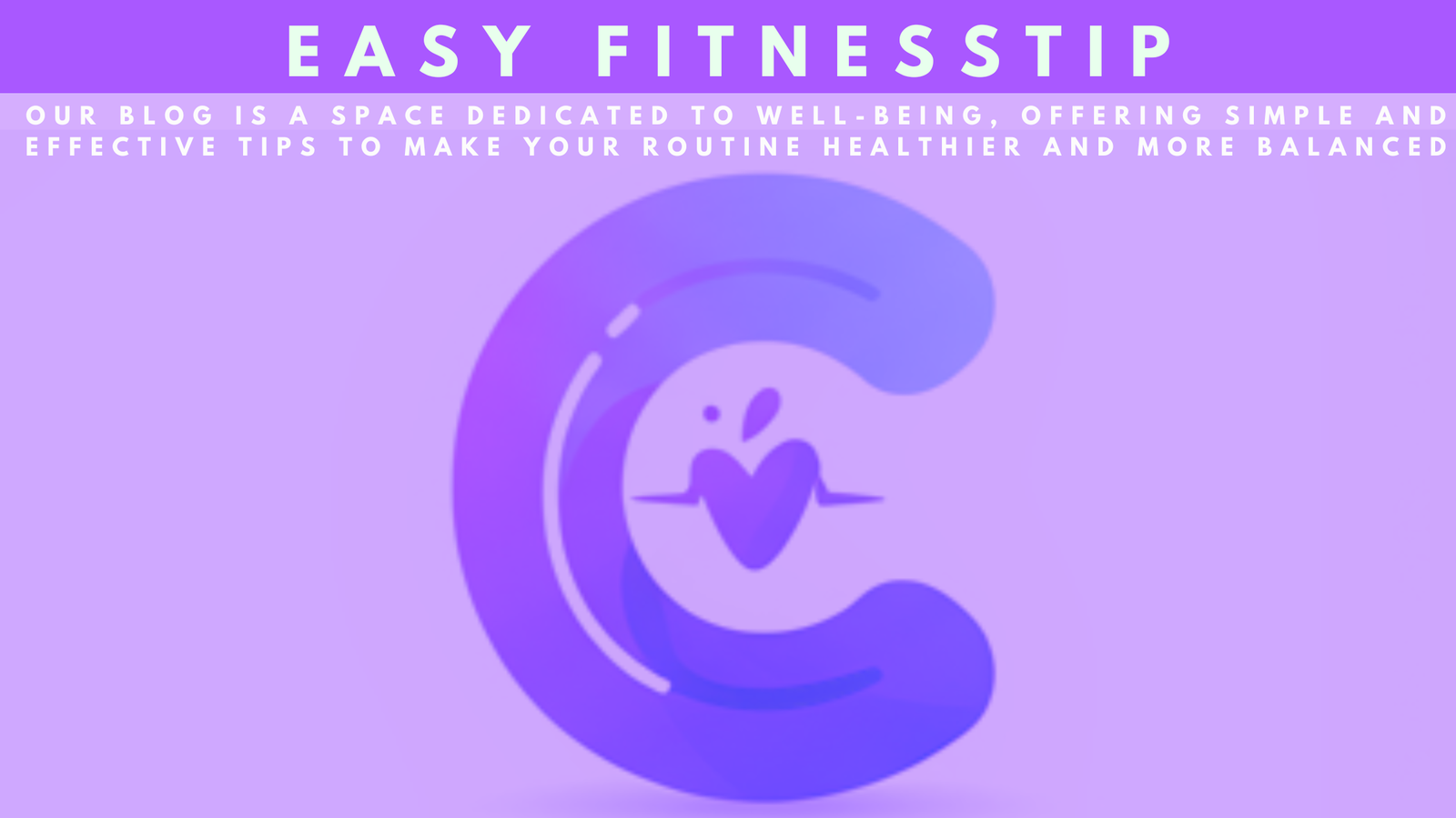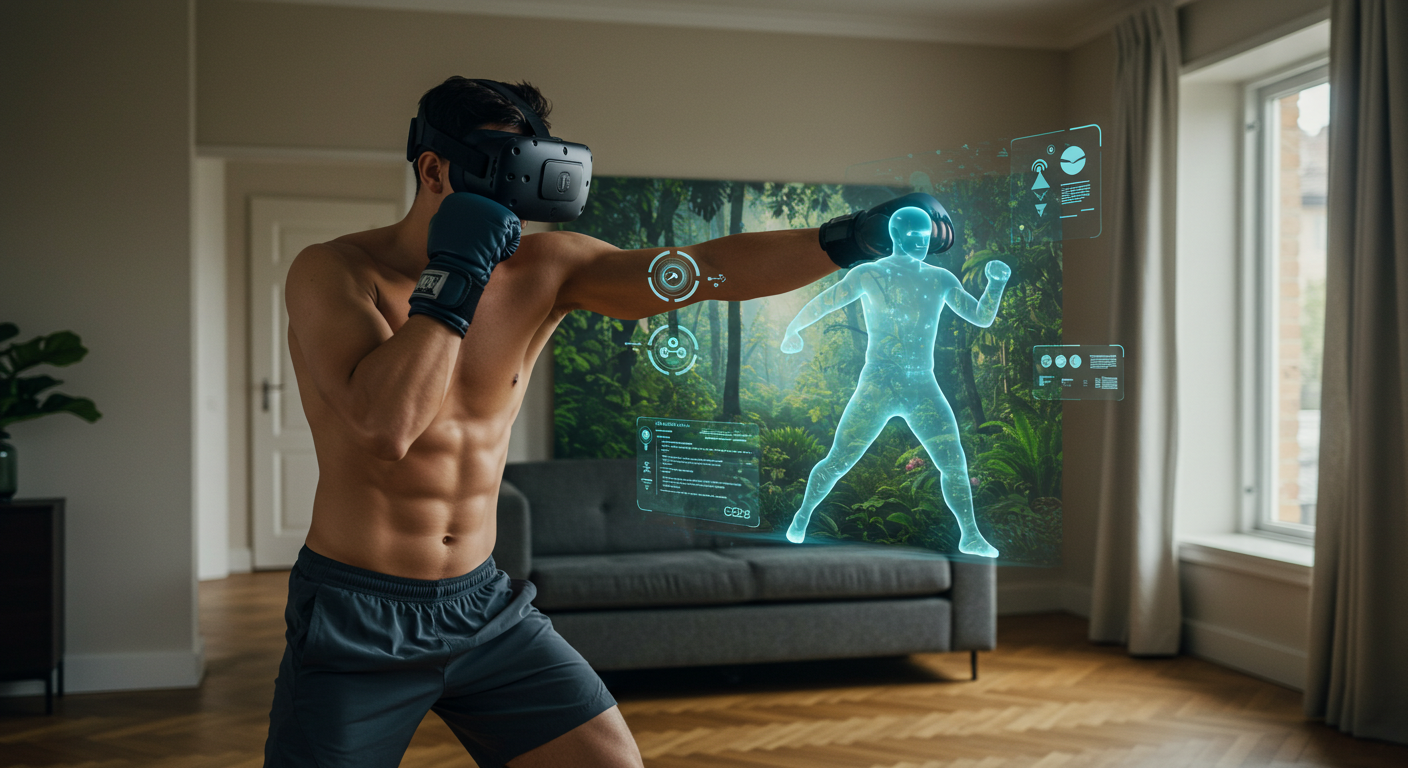
The world of wellness is undergoing a significant transformation with the advent of innovative technologies.
Artificial intelligence is being leveraged to create immersive experiences that combine physical exercise with mental well-being support, revolutionizing the way we approach health interventions.
These cutting-edge games are making health and wellness more engaging, personalized, and effective through game mechanics, providing users with a more enjoyable and sustainable path to improved fitness and psychological well-being.
This article will explore seven AI-powered wellness games, highlighting their unique approaches and benefits, as well as the scientific evidence supporting their effectiveness.
Key Takeaways
- Discover 7 innovative AI wellness games that combine fitness and mental well-being support.
- Learn how these games revolutionize the wellness industry with personalized experiences.
- Understand the scientific evidence backing the effectiveness of gamified approaches to mental health.
- Explore how to incorporate these games into your wellness routine for improved fitness and well-being.
- Find out how AI-driven wellness games create immersive, habit-forming experiences.
The Rise of AI-Driven Wellness Games
The rise of AI-driven wellness games marks a significant shift in how we approach mental wellbeing. These games are not just a form of entertainment but have evolved into sophisticated tools that leverage artificial intelligence to provide personalized mental health support.
How Technology is Transforming Mental Health Support
Technology has been increasingly integrated into mental health support systems, offering new avenues for treatment and intervention. AI-driven wellness games are at the forefront of this transformation, utilizing gamification to make mental health interventions more engaging and effective.
These games employ machine learning algorithms to analyze user behavior and tailor the experience to individual needs, enhancing personalization and effectiveness. By adapting to the user’s progress and preferences, AI-driven wellness games can maintain long-term engagement and provide sophisticated feedback mechanisms.
- AI enhances gamification by creating dynamic experiences that adapt to individual users’ needs and progress.
- Machine learning algorithms identify patterns in user behavior to customize game elements for maximum engagement.
- AI provides personalized feedback, helping users understand their progress and challenges.
The Science Behind Gamification for Wellbeing
The Unified Gamification and Motivation (UGM) model provides a framework for understanding how gamification elements can enhance treatment engagement. By incorporating game-like elements, interventions become more salient, increasing motivation and resulting in greater treatment usage.
Gamification leverages psychological principles to encourage desired behaviors, such as reward systems and progress tracking. The integration of AI further enhances these elements by providing real-time data analysis and adaptive difficulty adjustment.
| Gamification Element | Psychological Principle | AI Enhancement |
|---|---|---|
| Reward Systems | Operant Conditioning | Personalized rewards based on user behavior |
| Progress Tracking | Self-Efficacy Theory | Real-time data analysis for tailored feedback |
Why AI Makes Wellness Games More Effective
AI significantly enhances the effectiveness of wellness games by providing a level of personalization and adaptability that static systems cannot match. By analyzing user data, AI can identify when users are struggling and adjust the difficulty level or provide additional support.
Moreover, AI-driven personalization helps maintain long-term engagement by keeping content fresh and relevant. The analysis of data across large user populations also enables the identification of the most effective game elements for specific mental health challenges.
The combination of AI and gamification creates a powerful framework for enhancing treatment engagement and outcomes. As AI technology continues to evolve, we can expect to see even more sophisticated and effective wellness games.
Understanding Gamified Mental Health Apps NRAS, AI-driven Wellness Gamification, and How They Help You Stress Out Less
Gamified mental health apps are revolutionizing the way we approach stress management and emotional wellbeing. By integrating elements of game design and artificial intelligence, these apps create engaging experiences that motivate users to manage their mental health more effectively.
What Makes a Mental Health App “Gamified”
Gamification in mental health apps involves incorporating game design elements to encourage user engagement and participation in mental health activities. Common gamification elements include progress tracking, point systems, and reward mechanisms.
These elements work together to create an immersive experience that fosters emotional investment in mental health journeys. For instance, narrative and thematic elements can create a sense of purpose and meaning, while social features like cooperation and competition can enhance engagement and provide valuable social connections.
The Role of AI in Personalizing Mental Health Experiences
AI plays a crucial role in personalizing mental health experiences within these apps. By analyzing user data and behavior, AI-driven systems can tailor content, challenges, and feedback to individual needs and preferences.
This personalization can lead to a more effective and engaging mental health journey. For example, AI can adjust the difficulty level of challenges based on user performance, provide personalized recommendations for stress reduction techniques, and offer real-time feedback on progress.
The table below summarizes key aspects of AI-driven personalization in mental health apps:
| AI-Driven Feature | Description | Benefit |
|---|---|---|
| Content Tailoring | AI adjusts content based on user preferences and behavior | More relevant and engaging experience |
| Adaptive Challenges | AI adjusts challenge difficulty based on user performance | Increased motivation and engagement |
| Personalized Feedback | AI provides real-time feedback on user progress | Improved self-awareness and motivation |
Core Gamification Elements That Drive Engagement
Several core gamification elements drive engagement in mental health apps. These include progress tracking, point systems, reward mechanisms, narrative and thematic elements, social features, and personalization.
Progress tracking and feedback systems help users understand their progress and the impact of their actions on their mental health. Reward mechanisms, such as badges or prizes, motivate users to continue their mental health journey.
By combining these elements, mental health apps can create compelling experiences that keep users engaged and motivated to manage their mental health.
How AI Wellness Games Impact Your Brain and Body
Gamified mental health interventions, powered by AI, are emerging as a potent tool for enhancing both mental and physical wellbeing. These innovative solutions combine the engaging aspects of games with the personalization capabilities of AI to create effective mental health support systems.
Neurological Benefits of Gamified Mental Health Interventions
Gamified mental health interventions offer several neurological benefits. They can lead to increased neuroplasticity, allowing the brain to adapt and change in response to new experiences. This is particularly valuable for individuals dealing with mental health challenges, as it can help in developing more resilient mental processes.
The interactive nature of games stimulates various parts of the brain, potentially improving cognitive functions such as problem-solving and decision-making. Furthermore, the emotional engagement fostered by narrative and fantasy elements in games can enhance emotional regulation and intelligence.
Physical Health Improvements Through Digital Engagement

While the primary focus of AI wellness games is on mental health, they can also contribute to physical health improvements. Many of these games encourage physical activity, either directly through exercise-based challenges or indirectly by promoting overall wellbeing.
Digital engagement through these games can lead to better stress management, which is crucial for maintaining physical health. Chronic stress is associated with a range of physical health issues, including cardiovascular disease and compromised immune function. By reducing stress, AI wellness games can indirectly support physical health.
The Connection Between Game Rewards and Dopamine Release
The use of rewards in games is a key element in their ability to motivate and engage users. Rewards trigger the release of dopamine in the brain’s reward pathways, creating a positive feedback loop that encourages continued engagement.
Different types of rewards, such as achievement badges, level-ups, and narrative progression, can activate different reward responses. AI can optimize the timing and type of rewards to maximize the dopamine response based on individual user patterns, making the experience even more engaging and effective.
The dopamine release associated with game rewards can create positive associations with mental health practices, increasing motivation to continue them. This is particularly important for individuals struggling with depression, as it can help counteract anhedonia by providing accessible sources of positive reinforcement.
By leveraging the connection between game rewards and dopamine release, AI wellness games can drive lasting behavior change and reinforce positive mental health habits.
SuperBetter: Turning Recovery into an Epic Adventure

SuperBetter is a revolutionary mental health app that gamifies recovery, making it an epic adventure. By leveraging game design elements, SuperBetter enhances patient engagement and outcomes in mental health care. The app is designed to help users build resilience and achieve their mental health goals through a fun and interactive experience.
Key Features and Gamification Elements
SuperBetter incorporates several key features and gamification elements to make mental health recovery engaging. These include power-ups, bad guys, quests, and allies. Power-ups are positive actions users can take to improve their mental health, such as exercising or practicing gratitude. Bad guys represent challenges or negative thoughts that users need to overcome. Quests are specific tasks or goals that users work towards, and allies are supportive friends or family members who can provide encouragement and motivation.
The app’s gamification elements are designed to foster both extrinsic and intrinsic motivation. Initially, users may be motivated by extrinsic rewards such as earning points or completing levels. However, the ultimate goal is to develop intrinsic motivation, where users engage in healthy behaviors out of personal interest and satisfaction.
Scientific Evidence and Effectiveness
Research has shown that gamified mental health interventions like SuperBetter can be highly effective. Studies have demonstrated that gamification can increase user engagement and motivation, leading to improved mental health outcomes. SuperBetter has been backed by scientific research, showing positive results in building resilience and improving mental wellbeing.
The app’s effectiveness is further enhanced by its ability to personalize the experience for each user. By adapting to the user’s progress and challenges, SuperBetter provides a tailored approach to mental health recovery.
How to Maximize Benefits for Mental Wellbeing
To get the most out of SuperBetter, users should engage with the app regularly, using power-ups daily and tackling bad guys as they arise. Completing quests and recruiting allies can also enhance the experience. It’s essential to set realistic and achievable goals within the app, ensuring that the challenges are motivating rather than discouraging.
Integrating SuperBetter into daily routines can help create lasting mental health habits. Users can combine the app with other mental health approaches, such as therapy or medication, for comprehensive care. Maintaining motivation over the long term is crucial, and users can achieve this by celebrating their achievements and continuing to set new, challenging goals.
By following these strategies, users can maximize the benefits of SuperBetter for their mental wellbeing, turning their recovery into a successful and engaging adventure.
Headspace: Gamified Meditation for Stress Reduction
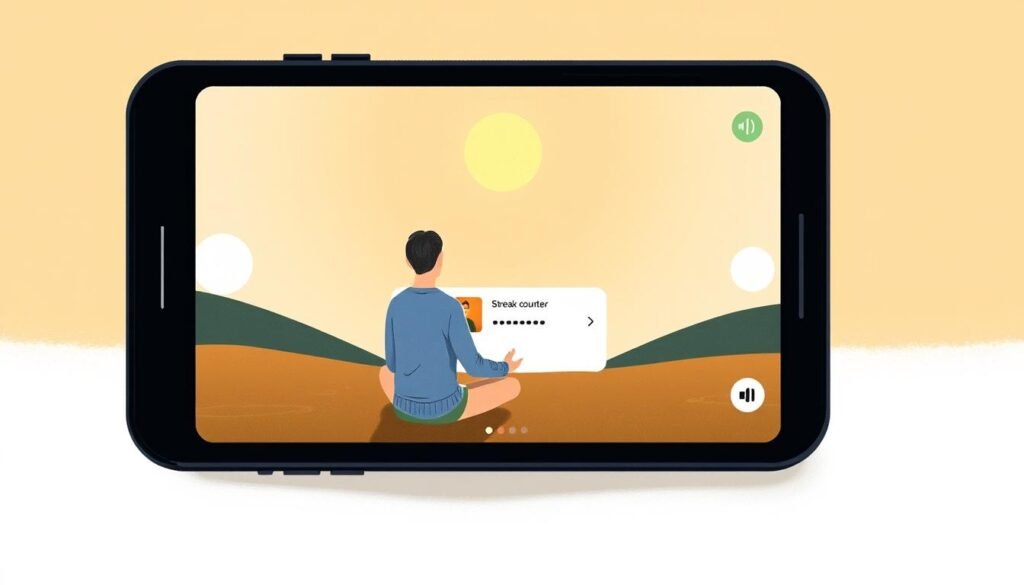
Headspace stands out in the meditation app market by leveraging gamified features to promote consistent practice and stress reduction. This popular meditation app has successfully integrated elements of gamification to enhance user engagement and motivation.
Meditation Streaks and Achievement Systems
One of the key gamification elements in Headspace is its use of meditation streaks and achievement systems. By maintaining a consistent meditation practice, users can build streaks and earn rewards, which can significantly boost their motivation to continue practicing.
The streak feature is particularly effective because it taps into the user’s desire for continuity and achievement. As users accumulate more days in their meditation streak, they are more likely to continue their practice to maintain their progress.
AI-Driven Personalization Features
Headspace also incorporates AI-driven personalization features that tailor the meditation experience to individual users’ needs and progress. This personalization enhances the effectiveness of the meditation sessions and keeps users engaged.
By analyzing user data and behavior, Headspace’s AI system can recommend specific meditation sessions and adjust the difficulty level to suit the user’s growing skills and needs.
Research-Backed Results for Anxiety and Depression
Numerous studies have investigated the effectiveness of Headspace in reducing symptoms of anxiety and depression. A systematic review of mental health apps, including Headspace, found a small to moderate effect size in reducing depressive symptoms compared to controls.
A randomized controlled trial demonstrated that Headspace users experienced significant reductions in anxiety and depression symptoms. The study highlighted the app’s potential as a valuable tool for mental health support.
The data from these studies indicate that Headspace’s combination of gamification and AI-driven personalization contributes to its effectiveness in improving mental health outcomes.
MoodMission: AI-Powered Quests to Combat Negative Emotions
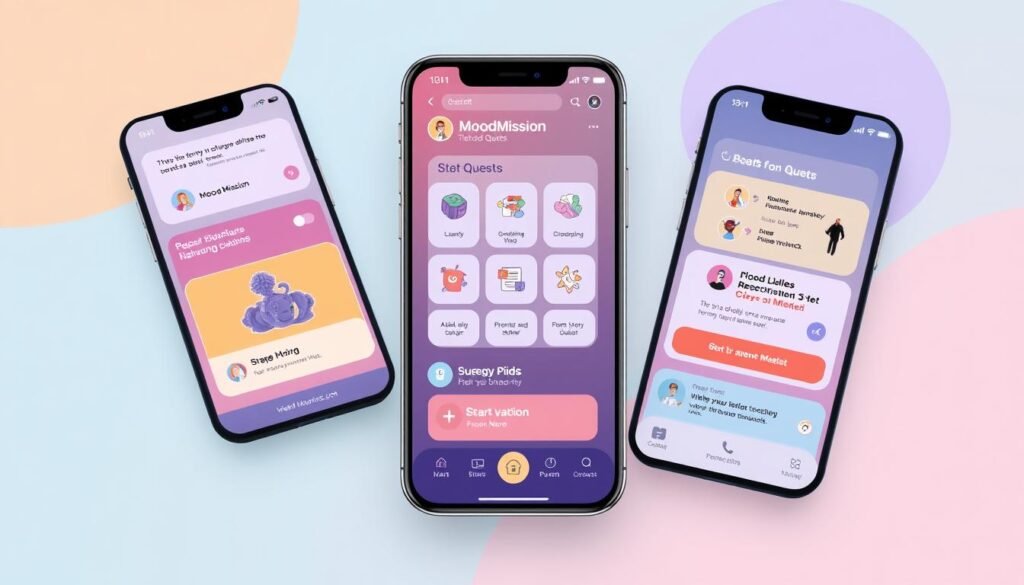
MoodMission is revolutionizing mental health support with its AI-powered quests designed to combat negative emotions. This innovative app leverages advanced technology to provide personalized interventions for users struggling with various mental health challenges.
How the App Identifies and Targets Specific Moods
MoodMission uses a sophisticated AI algorithm to identify and target specific moods, helping users manage their emotional states more effectively. Upon launching the app, users are guided through a process that assesses their current emotional state.
The AI-driven system then tailors a series of “missions” or activities designed to address the user’s particular needs, whether it’s anxiety, depression, or stress.
Mission Structure and Reward Systems
The missions within MoodMission are structured to be engaging and rewarding, utilizing gamification elements to motivate users. Each mission is designed to help users develop coping strategies and improve their mental wellbeing.
Upon completing a mission, users receive rewards that reinforce positive behaviors, encouraging continued engagement with the app.
Effectiveness for Different Mental Health Conditions
Research has shown that MoodMission is effective in addressing a range of mental health conditions, including anxiety and depression. Randomized controlled trials have demonstrated the app’s ability to reduce symptoms and improve overall mental health outcomes.
The effectiveness of MoodMission can vary depending on the severity of the condition and the individual’s engagement with the app. However, studies have consistently shown positive results, highlighting the app’s potential as a valuable tool in mental health support.
By providing personalized, AI-driven interventions, MoodMission offers a promising approach to improving mental health outcomes. Its innovative use of gamification and reward systems enhances user engagement, making it a valuable resource for those seeking to manage their mental wellbeing.
Happify: Turning Positive Psychology into Playful Challenges
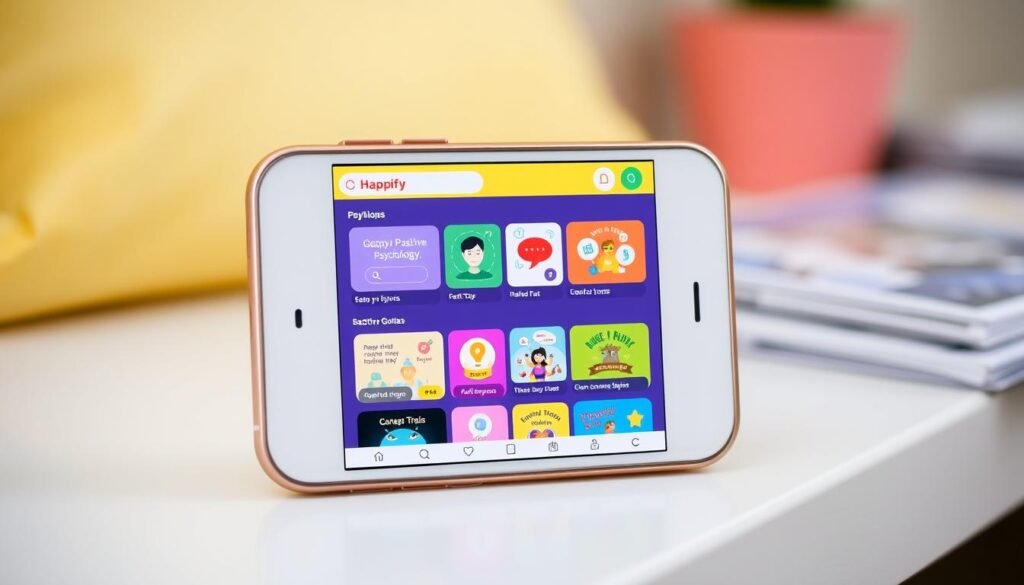
By transforming positive psychology into interactive experiences, Happify offers a unique approach to mental wellbeing. This innovative app combines the principles of positive psychology with engaging gamification elements to help users build resilience and improve their mental health.
Science-Based Games and Activities
Happify’s content is rooted in positive psychology, offering a variety of games and activities designed to promote emotional wellbeing. These exercises are crafted to help users develop coping skills, manage stress, and cultivate a more positive outlook on life.
The app features a range of engaging activities, from guided meditations to interactive games, all aimed at enhancing mental health. By making positive psychology practices enjoyable and accessible, Happify encourages users to maintain a consistent mental wellness routine.
Tracking Progress and Measuring Emotional Growth
Happify allows users to track their progress and measure their emotional growth over time. The app provides personalized insights and feedback, helping users understand their strengths and areas for improvement.
By monitoring their progress, users can see the positive impact of their efforts, which can be a powerful motivator. Happify’s tracking features provide a sense of accomplishment and encourage continued engagement with the app’s activities.
Integration of AI for Personalized Experience
Happify utilizes AI to create a personalized experience tailored to each user’s wellbeing needs and preferences. The app’s recommendation algorithm suggests activities based on user goals, preferences, and previous engagement patterns.
The AI technology adapts the content difficulty and type based on user progress, ensuring an optimal challenge level. This personalization creates more meaningful and relevant experiences, enhancing the effectiveness of the positive psychology interventions.
Furthermore, Happify’s AI analyzes user responses and engagement patterns to identify emotional strengths and areas for growth. This information is used to provide targeted recommendations and support, helping users achieve their mental health goals.
The combination of AI personalization and gamification in Happify creates a powerful system for building positive emotional habits and skills. By maintaining engagement and preventing boredom, the app ensures that users continue to benefit from its mental wellness resources.
Pacifica (now Sanvello): Gamifying CBT and Mindfulness
Sanvello, the rebranded Pacifica app, leverages AI and gamification to create a personalized mental health journey for its users. This evolution has positioned Sanvello as a leading mental health support platform, utilizing AI-driven wellness gamification to enhance user engagement and effectiveness.
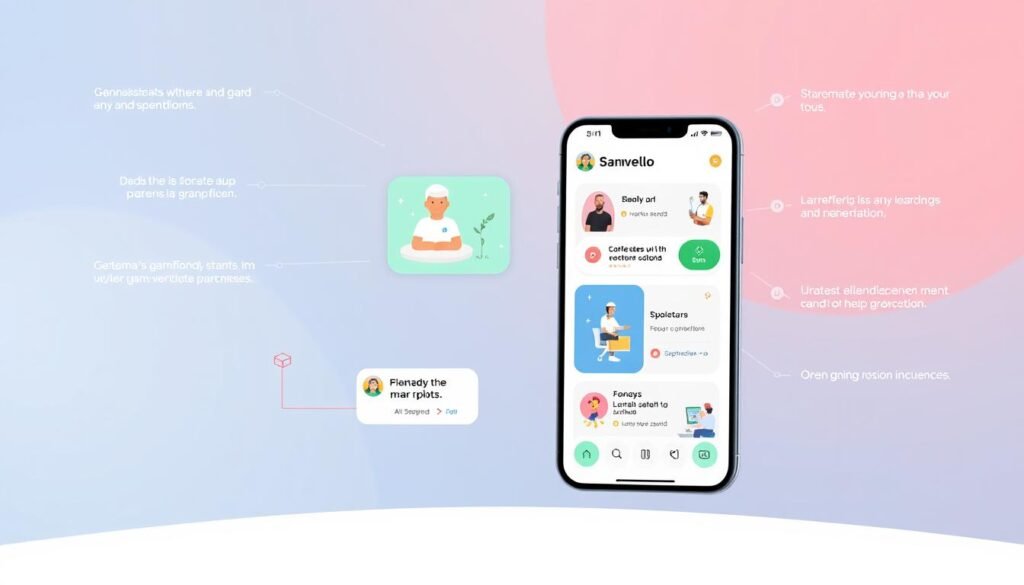
Daily Mood Tracking and Challenge Systems
Sanvello incorporates a daily mood tracking feature that allows users to monitor their emotional state over time. This data is used to tailor challenge systems that are relevant to the user’s current mental health needs.
The app’s challenge systems are designed to help users develop coping strategies and build resilience. By completing these challenges, users can track their progress and feel a sense of accomplishment.
Community Features and Social Support Elements
Sanvello recognizes the importance of community in mental health journeys. The app offers community features that allow users to connect with others who share similar experiences, providing a supportive environment.
These social support elements are crucial for users who benefit from shared understanding and connection. By fostering a sense of community, Sanvello helps users feel less isolated in their mental health journeys.
How AI Adapts to Your Mental Health Journey
At the heart of Sanvello’s effectiveness is its AI-driven personalization. The app’s AI analyzes user data, including mood tracking information and challenge completion rates, to identify patterns and customize recommendations.
This adaptation enables the app to adjust the difficulty and type of content based on the user’s current mental state and coping capacity. By doing so, Sanvello ensures that its interventions are delivered at the right time and in the right manner, enhancing their effectiveness.
The AI also identifies potential mental health deterioration and proactively suggests appropriate interventions. This proactive approach helps users navigate different phases of their mental health journey, from crisis management to skill building and maintenance.
Woebot: AI Chatbot Therapy with Game Mechanics
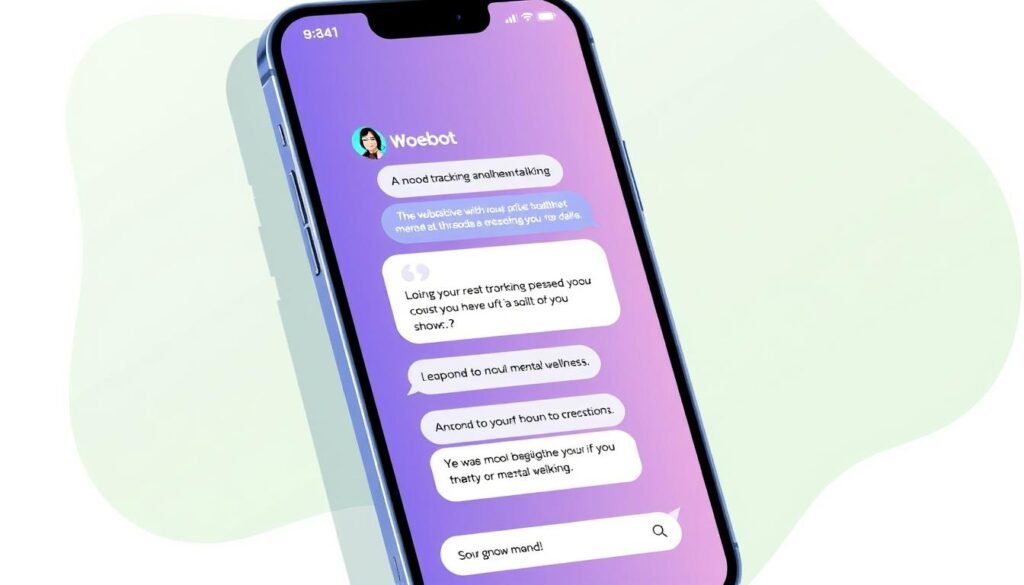
Woebot’s unique blend of conversational AI and game mechanics offers a promising approach to improving mental health outcomes. This AI-driven chatbot therapy platform is designed to provide support and interventions for individuals dealing with mental health issues such as depression and anxiety.
Conversational AI and Therapeutic Techniques
Woebot utilizes advanced conversational AI to engage users in therapeutic conversations, employing techniques derived from cognitive-behavioral therapy (CBT) and other evidence-based practices. The AI is designed to understand and respond to user inputs in a manner that simulates human-like interaction, making the therapeutic experience more relatable and engaging.
The conversational AI in Woebot is built on sophisticated natural language processing (NLP) algorithms, allowing it to interpret user emotions and respond appropriately. This capability enables Woebot to offer personalized support, tailoring its interactions to the individual user’s needs and progress.
Gamification Elements That Enhance Engagement
To enhance user engagement, Woebot incorporates various gamification elements. These include interactive tools, mood-tracking features, and activities designed to help users manage their mental health more effectively. The gamification elements are carefully integrated to make the therapeutic process more enjoyable and rewarding.
By leveraging game mechanics such as rewards, challenges, and progress tracking, Woebot motivates users to consistently engage with the platform. This approach not only improves adherence to therapeutic exercises but also fosters a sense of accomplishment and motivation.
Research on Effectiveness for Depression and Anxiety
Numerous studies have investigated Woebot’s effectiveness in addressing depression and anxiety. A key aspect of this research involves randomized controlled trials (RCTs), which have shown that Woebot can significantly reduce symptoms of depression and anxiety in users.
One RCT highlighted in the research demonstrated that participants using Woebot experienced a notable reduction in depressive symptoms compared to a control group. Furthermore, studies have indicated that Woebot’s conversational AI approach can lead to high levels of user engagement and satisfaction, comparable to traditional therapeutic methods.
The research also suggests that Woebot can be an effective complement to traditional therapy or serve as a standalone intervention for individuals with mild to moderate mental health concerns. By providing accessible and engaging mental health support, Woebot has the potential to improve mental health outcomes for a wide range of users.
Moodfit: Building Mental Fitness Through Gamified Goals

Moodfit stands out in the mental wellness space by leveraging gamification to foster mental fitness. This innovative app is designed to help users build resilience and improve their mental wellbeing through engaging, goal-oriented activities.
Goal-Setting and Achievement Systems
Moodfit’s goal-setting feature is a core component of its gamification strategy. Users can set personalized mental fitness goals, track their progress, and achieve milestones. The app’s achievement system rewards users for their accomplishments, providing a sense of fulfillment and motivation to continue their mental fitness journey.
The goal-setting process is tailored to individual needs, allowing users to focus on areas that are most relevant to their mental wellbeing. By achieving these goals, users build confidence and develop healthy habits that contribute to long-term mental fitness.
Personalized Mental Health Insights Through AI
Moodfit utilizes AI to provide users with personalized mental health insights. By analyzing user data and behavior, the app offers tailored recommendations to enhance mental wellbeing. This AI-driven approach ensures that users receive relevant and actionable advice to improve their mental health.
The integration of AI enables Moodfit to adapt to the user’s progress and adjust its suggestions accordingly. This dynamic approach helps users address specific mental health challenges and develop more effective coping strategies.
Integrating Physical and Mental Wellness Activities
Moodfit takes a holistic approach to wellbeing by integrating physical and mental wellness activities into a unified system. The app recognizes the intrinsic link between physical health factors such as sleep, exercise, and nutrition, and mental wellbeing.
By tracking and improving physical wellness factors alongside mental health practices, users can experience synergistic benefits that enhance overall wellbeing. Moodfit gamifies both physical and mental wellness activities through a unified achievement and goal system, motivating users to adopt a healthier lifestyle.
The app helps users understand the connections between their physical habits and mental states through data visualization and insights. This holistic approach addresses the full spectrum of factors that influence mental health, creating more comprehensive improvements in overall wellbeing.
Key Gamification Elements That Make Mental Health Apps Effective
By integrating gamification elements, mental health apps can significantly improve user engagement and overall mental health outcomes. Gamification involves using game design elements in non-game contexts to enhance user experience and encourage desired behaviors. In the context of mental health apps, gamification can play a crucial role in motivating users to engage with the app’s content and features consistently.
Progress Tracking and Achievement Systems
Progress tracking and achievement systems are fundamental gamification elements that help users monitor their progress and feel a sense of accomplishment. These systems often include features like streaks, milestones, and rewards for completing specific tasks or achieving certain goals. By providing a clear visual representation of progress, these systems can motivate users to continue using the app and striving for improvement.
Key features of progress tracking and achievement systems include:
- Visual progress indicators
- Milestone achievements
- Streaks and consistency tracking
- Reward systems for accomplishments
Rewards and Reinforcement Mechanisms
Rewards and reinforcement mechanisms are critical in maintaining user engagement. These can include virtual rewards, badges, or other forms of recognition that users can earn by completing tasks or achieving specific milestones. The use of rewards taps into the psychological principle of reinforcement, encouraging users to repeat desired behaviors.
Examples of rewards and reinforcement mechanisms:
- Badges or trophies for completing challenges
- Virtual currency or tokens
- Unlockable content or features
- Social sharing options to showcase achievements
Narrative and Thematic Elements
Narrative and thematic elements can enhance the user experience by providing context and emotional resonance. Many mental health apps use storytelling or thematic frameworks to make the experience more engaging and relatable. These elements can help users connect with the app on a deeper level, making the experience more meaningful and impactful.
Narrative elements can include:
- A storyline or character progression
- Thematic challenges or quests
- Immersive environments or settings
Social Connection and Community Features
Social connection and community features are vital in mental health apps, as they provide users with a sense of belonging and support. These features can include discussion forums, peer support groups, or social sharing options. By connecting users with others who share similar experiences or goals, these features can foster a supportive community that enhances the overall user experience.
| Feature | Description | Benefits |
|---|---|---|
| Discussion Forums | Online spaces for users to share experiences and advice | Support, community building |
| Peer Support Groups | Groups for users to connect with others facing similar challenges | Emotional support, shared understanding |
| Social Sharing | Options to share achievements or progress on social media | Motivation, social recognition |
Personalization and Adaptive Challenges
Personalization and adaptive challenges are key to maintaining user engagement over time. By using AI and algorithms to tailor the content and difficulty level to the individual user’s needs and progress, mental health apps can provide a more effective and engaging experience. Adaptive challenges help maintain an optimal balance between difficulty and skill, creating a state of flow that enhances user engagement.
The benefits of personalization include:
- Increased user engagement
- Improved relevance of content
- Enhanced sense of autonomy and motivation
How to Choose the Right AI Wellness Game for Your Needs
With the proliferation of AI-driven wellness games, choosing the right one that aligns with your mental health needs is crucial. The numerous options available can make the selection process overwhelming, but by considering several key factors, you can identify the most suitable game for your specific requirements.

Assessing Your Mental Health Goals and Preferences
Before diving into the world of AI wellness games, it’s essential to clearly define your mental health goals. Are you looking to manage stress, improve your mood, or enhance your cognitive function? Different games focus on various aspects of mental wellbeing, so understanding your objectives will help narrow down your choices.
Consider your preferences as well. Some individuals may prefer games with a competitive element, while others might enjoy more relaxing or creative experiences. Think about your comfort level with technology and whether you prefer guided or self-directed interventions.
Evaluating App Features and Evidence Base
Once you have a clear idea of your goals and preferences, it’s time to evaluate the features of different AI wellness games. Look for apps that offer personalized experiences, as these are more likely to be effective for your specific needs. Consider the types of activities or interventions provided, such as meditation, cognitive-behavioral therapy (CBT) exercises, or mood tracking.
It’s also crucial to examine the evidence base supporting the app’s effectiveness. Look for games that have been studied in clinical trials or have user reviews that attest to their efficacy. Be wary of apps that make exaggerated claims or lack transparency about their methods and outcomes.
Privacy Considerations for Mental Health Data
Privacy considerations are particularly important when using AI wellness games that collect sensitive mental health data. As noted by experts, “The sensitive nature of mental health information necessitates robust privacy protections.” Users should carefully review privacy policies and data handling practices before using these apps.
These apps typically collect various types of data, including mood states, thought patterns, behaviors, and sometimes biometric information. When evaluating an app’s privacy policy, look for information on data storage, sharing, and anonymization practices. Consider whether the data is processed locally on your device or sent to cloud servers, as this can impact your privacy.
To maintain privacy while benefiting from AI wellness games, consider using pseudonyms or adjusting privacy settings within the app. Be aware of relevant privacy regulations like HIPAA and GDPR, which may protect your mental health data.
“The protection of sensitive mental health information is paramount. Users must be vigilant about the data they share and understand how it is used.”
By carefully assessing your goals, evaluating app features, and considering privacy implications, you can make an informed decision when choosing an AI wellness game that meets your needs.
Implementing AI Wellness Games into Your Daily Routine

To get the most out of AI wellness games, it’s essential to integrate them into your daily life effectively. These games are designed to support mental health, but their benefits are maximized when used consistently and as part of a broader wellness strategy.
Creating Sustainable Habits for Long-Term Benefits
Creating sustainable habits is crucial for long-term benefits from AI wellness games. To achieve this, start by setting aside a specific time each day for playing these games. Consistency is key to developing a habit. For instance, you might choose to play during your morning commute or right before bed. It’s also helpful to integrate these games with other daily activities, such as exercise or meditation, to create a comprehensive wellness routine.
Another effective strategy is to begin with small, achievable goals. Instead of trying to dedicate an hour a day, start with 10-15 minutes and gradually increase the duration as the habit forms. Reminders can also be useful in maintaining consistency, especially during the initial stages.
Combining Digital Interventions with Traditional Care
AI wellness games can be a valuable addition to traditional mental health care. They offer a supplementary tool that can enhance the effectiveness of other treatments. For example, a therapist might recommend a specific AI game to support a patient’s cognitive behavioral therapy (CBT) or mindfulness practices.
When combining digital interventions with traditional care, it’s essential to communicate with your healthcare provider about your use of AI wellness games. This ensures that all aspects of your treatment are coordinated and that the games are used in a way that complements your existing care plan.
Setting Realistic Expectations and Measuring Progress
Setting realistic expectations is vital when using AI wellness games. These tools can provide significant benefits, but they are not a quick fix. Results typically require consistent engagement over time. Research suggests that noticeable improvements in mental health can take anywhere from a few weeks to several months, depending on the individual and the specific intervention.
To measure progress, it’s helpful to identify meaningful metrics beyond the app’s built-in tracking systems. This might include tracking changes in mood, sleep patterns, or overall sense of wellbeing. Celebrating small wins and progress milestones is also crucial for maintaining motivation.
- Identify specific metrics for measuring progress, such as mood or sleep quality.
- Recognize subtle improvements in thinking patterns and behaviors.
- Distinguish between normal fluctuations in mental health and significant trends.
- Celebrate small wins to maintain motivation.
- Adjust goals or try different approaches if progress plateaus.
By implementing AI wellness games into your daily routine effectively, you can maximize their benefits and support your overall mental health journey.
Potential Limitations and Considerations of AI Wellness Games
As we continue to integrate AI wellness games into our mental health routines, it’s essential to consider the potential challenges and limitations. While these tools offer numerous benefits, there are also important factors to consider when evaluating their effectiveness and appropriateness for individual needs.
When Gamification May Not Be Appropriate
Gamification is not a universally suitable approach for mental health support. Certain individuals may not respond well to game-like interventions, particularly those who prefer more traditional or straightforward therapeutic methods. For instance, some people might find the competitive aspects of gamification counterproductive or stressful. It’s crucial to assess individual preferences and needs before recommending AI wellness games. Moreover, gamification may not be appropriate for severe mental health conditions that require more intensive, professional intervention. In such cases, AI wellness games should be used under the guidance of a healthcare professional as a supplementary tool rather than a primary treatment.
The Balance Between Extrinsic and Intrinsic Motivation
AI wellness games often rely on extrinsic motivators, such as rewards and achievements, to encourage engagement. While these elements can be effective in the short term, there’s a risk of over-reliance on external rewards. Research suggests that intrinsic motivation, or the desire to engage in an activity for its inherent value, is more sustainable in the long run. Therefore, it’s essential to strike a balance between extrinsic and intrinsic motivation. Developers can achieve this by incorporating features that foster personal growth and self-efficacy, helping users transition from external to internal motivators over time.
Ethical Considerations in AI-Driven Mental Health Tools
The use of AI in mental health tools raises several ethical considerations. One primary concern is data privacy and security. AI wellness games often collect sensitive mental health data, which must be handled with care to prevent unauthorized access or misuse. Another issue is algorithm transparency; some AI systems operate as “black boxes,” making it difficult to understand how they arrive at their recommendations. This lack of transparency can be particularly problematic in mental health contexts, where understanding the rationale behind recommendations is crucial. Additionally, there’s a risk of bias in AI systems, which could lead to unequal or inappropriate support for different populations. Developers must be aware of these potential biases and take steps to mitigate them.
To address these ethical considerations, developers and companies have a responsibility to ensure their AI wellness games are designed and implemented responsibly. This includes providing evidence-based support, being transparent about data use and algorithm functioning, and continually monitoring and addressing potential biases. By acknowledging and addressing these limitations and ethical considerations, we can harness the full potential of AI wellness games to support mental health while minimizing potential risks.
The Future of AI-Driven Gamification for Mental Health

Future advancements in AI-driven gamification hold tremendous promise for enhancing mental health outcomes. As technology continues to evolve, we can expect significant improvements in how mental health support is delivered and experienced. The continued integration of gamified elements into therapeutic contexts holds significant potential for enhancing pediatric healthcare outcomes.
Emerging Technologies and Innovations
The future of AI-driven gamification in mental health is being shaped by several emerging technologies and innovations. One of the most exciting developments is the use of virtual reality (VR) and augmented reality (AR) to create immersive experiences that can simulate real-world environments for exposure therapy and stress management.
“The use of VR and AR in mental health is not just about creating engaging experiences; it’s about providing clinically effective interventions that can be personalized to individual needs.”
Another area of innovation is the integration of machine learning algorithms that can analyze user behavior and adapt the gamification elements in real-time to maximize engagement and effectiveness.
Integration with Wearables and Biometric Data
The integration of AI-driven gamification with wearables and biometric data is set to revolutionize mental health support. By leveraging data from wearable devices, mental health apps can gain a more comprehensive understanding of a user’s physiological and emotional state.
This integration enables the creation of more personalized and responsive interventions. For instance, a mental health app could use heart rate variability data from a smartwatch to detect early signs of stress and trigger a guided relaxation exercise.
- Enhanced personalization through real-time physiological data
- Improved accuracy in detecting mental health states
- More timely and relevant interventions
Predictions for Next-Generation Mental Health Games
As we look ahead, next-generation mental health games are likely to feature more sophisticated narrative experiences that create deeper emotional engagement and meaning. These games will better integrate evidence-based therapeutic approaches with engaging gameplay mechanics.
Future mental health games will also incorporate more adaptive and intelligent systems that can provide truly personalized support. This could involve AI-driven characters that respond to the user’s emotional state or dynamic difficulty adjustment based on the user’s progress and mental health status.
“The future of mental health support lies in creating seamless, integrated experiences that blur the lines between games, therapy, and daily life.”
Moreover, future developments will focus on creating more meaningful social connections while maintaining privacy and safety. This could involve anonymous support groups within games or social features that encourage users to share their progress and achievements in a safe and supportive environment.
By addressing the needs of diverse populations and cultural contexts, future mental health games will be more inclusive and effective. The boundaries between games, therapy, and daily life will continue to blur, providing more seamless and integrated mental health support.
Conclusion
As we conclude our exploration of AI wellness games, it’s clear that these innovative tools are transforming mental health support. The integration of gamification in these apps is making mental health interventions more engaging and effective.
The seven AI wellness games we examined – SuperBetter, Headspace, MoodMission, Happify, Pacifica/Sanvello, Woebot, and Moodfit – each offer unique approaches to improving mental health. They utilize various gamification elements, such as rewards, challenges, and progress tracking, to enhance user engagement and promote health well-being.
Effective gamification elements identified throughout our analysis include progress tracking, achievement systems, and social connection features. These elements not only make mental health practices more enjoyable but also foster a sense of accomplishment and motivation.
While the current state of evidence supporting AI wellness games is promising, there are areas where more research is needed. Studies have shown that both mental health apps with and without gamification elements can be effective in reducing depressive symptoms. However, the added value of gamification lies in its ability to increase user engagement and adherence.
Choosing the right app for individual needs and implementing it in a sustainable way is crucial. Users must consider their mental health goals and preferences when selecting an app. Moreover, it’s essential to be aware of the potential limitations and ethical considerations associated with AI-driven mental health tools.
Despite these considerations, the future of AI wellness games looks promising. As technology continues to evolve, we can expect these tools to become even more sophisticated and effective. The potential impact of AI wellness games on mental health support is significant, making them an exciting development in the field.
In conclusion, AI wellness games are poised to revolutionize mental health support by making it more accessible, engaging, and personalized. As we move forward, it’s essential to continue researching and developing these tools to maximize their benefits.
References
- Supernatural VR
- FitXR
- SPARX
- Royal College of Psychiatrists Blog: “The serious game that provides CBT – Dr Mathijs Lucassen discusses SPARX”
Link
- Royal College of Psychiatrists Blog: “The serious game that provides CBT – Dr Mathijs Lucassen discusses SPARX”
- Manifest AI
- Bustle Article: “This AI Wellness App Listens To Your Words & Gives You Personalized Manifestations”
Link
- Bustle Article: “This AI Wellness App Listens To Your Words & Gives You Personalized Manifestations”
- Joy
- AP News Article: “Parkland school shooting survivor develops Joy, an app built on AI that helps people heal”
Link
- AP News Article: “Parkland school shooting survivor develops Joy, an app built on AI that helps people heal”
- Neurofit
- Business Insider Article: “A New York City-based startup combined neuroscience with AI to build an app that helps with chronic stress”
Link
- Business Insider Article: “A New York City-based startup combined neuroscience with AI to build an app that helps with chronic stress”
- LINA
- ACM Digital Library Paper: “LINA – A social augmented reality game around mental health supporting real-world connection and sense of belonging for early adolescents”
Link
- ACM Digital Library Paper: “LINA – A social augmented reality game around mental health supporting real-world connection and sense of belonging for early adolescents”
These references provide comprehensive insights into each AI-powered wellness game, supporting the blog post’s content with credible sources.
